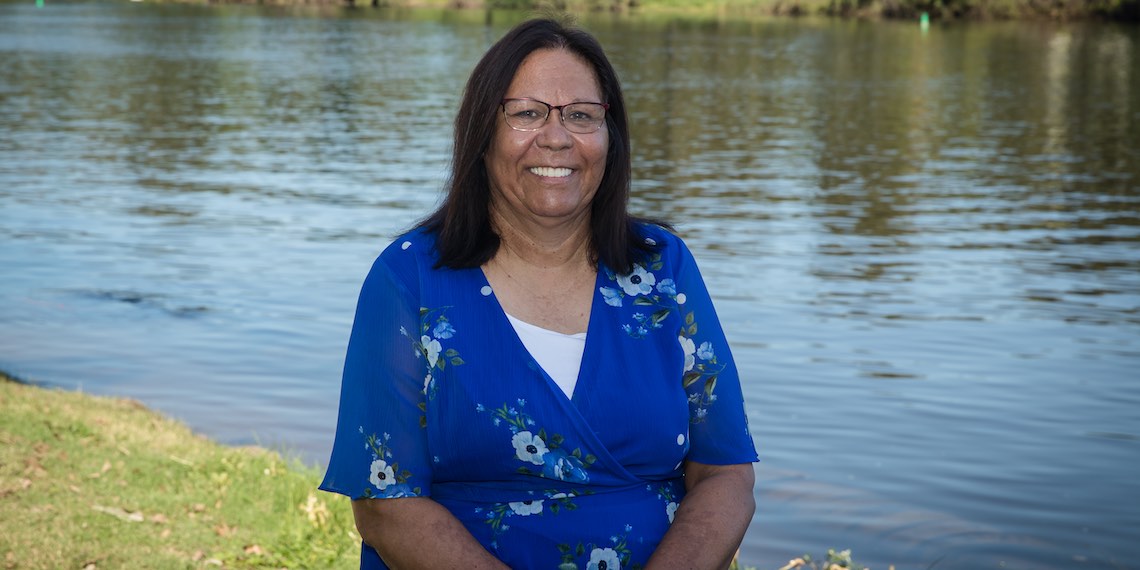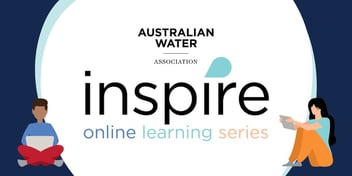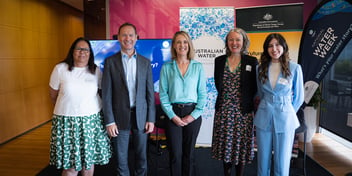Our water stories: learning from one another for the future of water

While water professionals are aware of the value of our most precious resource, First Nations people have much to share about their connection to water, how it is intrinsically linked to culture, and why listening to one another’s stories is so important.
This year’s National Water Week (17-24 October) theme, "Our Water Stories", encourages individuals and communities to reflect on why water is important to them. In this spirit, AWA asked Sydney Water First Nations Inclusion Specialist Veronica Murphy to share her water story.
Set to deliver the Acknowledgement of Country at the National Water Week launch at Sydney Water on 17 October, Murphy said her connection to water is especially personal – it starts, fundamentally, with her identity.
“For me water has great importance because it is linked to my identity as an Aboriginal woman. I’m from Gamilaroi Country (Moree, NSW) and I consider myself a freshwater person. From a freshwater perspective, the rivers were my playground growing up,” she said.
“We have two rivers out there and water is very much connected to recreation and cultural activities. We fish the rivers, but the rivers are also a place where families come together to spend time yarning, teaching our kids, talking about Country, family connections and the significance of place. The rivers are integral to our community.
“Moree is also famous for its artesian bores, or hot water springs, and the healing benefits from these waters are also important for us.”
Murphy said the Gamilaroi are connected to water through creation stories and caring for Country, and the water that sustains life is crucial for her and her people.
“We have creation stories around how creeks and rivers and billabongs were formed, and it plays a huge part in our lives. Talking to our elders from our area, they have insight into how the water there has changed over the years,” she said.
“The river we swim in is the Gwydir River. When it has water, there is a nice flow and it is a very cool place. But our elders talk about a time when that water was crystal clear – you could see the rocks on the bottom.
“Unfortunately, due to cattle and cotton farming in the area, the river’s landscape has been changed, as well as the quality of the water.
“But water is vital for life. It is such a valuable commodity. Working to help foster a greater understanding of how important water is to us, and recognising the role that we can all play, is critical to ensuring that we have healthy water.”
Family ties
Coming into Sydney Water late 2020, Murphy said she’s always held some curiosity about why people end up staying in the sector for so long – with her uncle having worked for the utility for more than two decades.
“I was at a point in my career where I needed a bit of a change. I saw the role at Sydney Water as a great opportunity to make a difference, especially for my own mob,” she said.
“My uncle joined Sydney Water in the late 1970s. He came through a pre-employment program, ended up in a full-time role and stayed with Sydney Water for over 20 years. That really attracted me.
“It got me thinking about why people stay so long in certain jobs, and I thought Sydney Water must be a great place to work.”
And, after working with Sydney Water for 18 months, Murphy said she has found out why it is that many people dedicate their careers to water.
“The secret is really the people. There is a lot of respect and openness from people to listen to new ideas, try new things, and water people are passionate about the wellbeing of others,” she said.
“There is a willingness to listen to me as an Aboriginal person, talking about my own culture and how water plays such a huge part in the lives of Aboriginal people.
“I have learned so much about the water sector since I started with Sydney Water, and the organisation has learned a lot from me, too. I’ve learned all about what Sydney Water is doing to improve the way we manage water, but in my role, I have seen the organisation listen and learn from First Nations people.”
Working in water
As a First Nations Inclusion Specialist, Murphy said her role is primarily implementing Sydney Water’s Reconciliation Action Plan, with a very strong focus on increasing the representation of First Nations people within the organisation.
“The two biggest parts of my work at the moment are increasing First Nations employee representation at Sydney Water, increasing job opportunities and working with a number of First Nations recruitment agencies,” she said.
“But this work is also about building the attraction piece, which involves talking to the community about why they might want to come and work for Sydney Water and discussing the employee value proposition for First Nations people.”
Importantly, Murphy’s work at Sydney Water is also about building the utility’s cultural capability to ensure that it is a culturally safe place for First Nations people to work.
“If we are going to bring more Aboriginal and Torres Strait Islander people into the organisation, we need to ensure we have a culturally safe workplace environment,” she said.
Murphy said one of the things she loves most about her role is working with people and seeing the changes that can be made when people dedicate themselves to listening, and working together.
“Engaging with people is one the best parts of my job. My role exposes me to different parts of the business, and I have met a lot of people and heard a lot about the work that they are doing,” she said.
“Hearing about the different projects that are being facilitated in Aboriginal communities, it’s exciting to hear that people are engaging with Aboriginal stakeholders and working on projects together.
“I also love hearing the feedback from employees, particularly our Aboriginal employees, around these projects. I have seen the momentum that has been building in the organisation over the past two years and it’s been great to see how Sydney Water has embraced Aboriginal culture and history.
“It’s very rewarding to see all of our effort and work coming to fruition.”
Listening, learning, sharing
Murphy said helping to bring a heightened level of cultural awareness to Sydney Water is one of the things she is most proud of, including leading the launch of the utility’s First Nations Cultural Awareness e-Learning Module.
“The launch of our e-Learning Module was a really great moment for me. It’s an important piece of work, and Sydney Water hadn’t yet had a resource like this available to its employees,” she said.
“The positive feedback from people who have engaged with the module has been really great, I’ve loved seeing the resource make such an impact. Some people who have completed the training said they were brought to tears by some of the learnings they gained from the module.”
Aside from helping Sydney Water staff learn about First Nations culture and generate a higher level of cultural sensitivity, Murphy said she is also very proud to have helped with the recruitment of four new First Nations trainees.
“We’ve placed our new trainees right across the business, including our customer hub, our labs, our water resources recovery team and our digital team,” she said.
“It’s great hearing from the trainees about their first impression of working at Sydney Water. They have felt very welcomed and supported. Knowing that the business is welcoming people in and that our new trainees feel comfortable is so rewarding for me.”
Murphy said continuing to promote the value of water for all is important, but that there is still so much that can be learned about water from First Nations people, which is all about ensuring all voices and knowledges are included.
“As an organisation, we want to learn more about how First Nations peoples managed water in the past, and what lessons can be learned for the future,” she said.
“It’s about two-way knowledge sharing. First Nations people have a lot to share about how water is best managed, and it’s crucial that these learnings are brought into the future of how we protect and nurture our most precious resource.”



